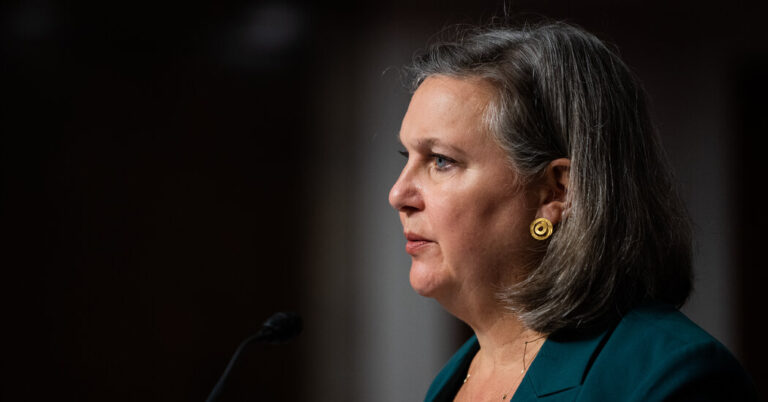Victoria J. Nuland, the third-ranking official at the State Department and a determined advocate of tough policies toward Vladimir V. Putin’s Russia, will retire this month after more than 30 years of government service.
Secretary of State Antony J. Blinken announced Ms. Nuland’s departure from the post of under secretary for political affairs on Tuesday in a statement noting her “fierce passion” for freedom, democracy and human rights, and America’s promotion of those causes abroad.
Mr. Blinken singled out her work on Ukraine, which he called “indispensable to confronting Putin’s full-scale invasion” of the country.
Ms. Nuland held numerous State Department positions, including spokeswoman, and once served as deputy national security adviser to Vice President Dick Cheney. But she made her mark as a Russia specialist who long argued for marshaling strong resistance to Mr. Putin’s territorial ambitions and foreign political influence.
As the State Department’s top Russia official during the Obama administration, she argued unsuccessfully for arming Ukraine with antitank missiles, and during the Biden administration has been among the biggest proponents of sending Ukraine more and better U.S. weapons.
A skilled bureaucratic operator, she delivered her arguments with sharp wit and a bluntness that drew a mixture of admiration and fear from colleagues. “She always speaks her mind,” Mr. Blinken’s statement gently noted.
She became more widely known in 2014 after referring with an expletive to the European Union in a phone call about Ukrainian politics that was recorded and leaked, in what U.S. officials believe was the work of Russia.
During the Biden administration, Ms. Nuland became a lightning rod for skeptics of U.S. support for Ukraine. “Nobody is pushing this war more than Nuland,” the Tesla co-founder Elon Musk wrote on the social media site X last February.
She was reviled in Moscow as an avatar of a Washington establishment that was seen as conspiring to undermine Russia and even overthrow Mr. Putin. Russian officials and media outlets constantly recall the way Ms. Nuland, then the U.S. assistant secretary for European and Eurasian affairs, distributed food to protesters in Kyiv’s central square in early 2014 who eventually toppled Ukraine’s Kremlin-backed leader.
“A coup against the government happened in Ukraine in 2014 after under secretary of state Victoria Nuland handed out cookies to terrorists,” the Russian foreign minister, Sergey V. Lavrov, said last year. (Ms. Nuland has said she passed out sandwiches, not cookies.)
Ms. Nuland’s departure was treated as major news by the Kremlin-backed, English-language news site RT, which featured a red banner across its home page and the headline “NULAND QUITS.”
RT quoted Russia’s foreign ministry spokeswoman, Maria Zakharova, as attributing Ms. Nuland’s departure to “the failure of the anti-Russian course of the Biden administration.” She charged that “Russophobia, proposed by Victoria Nuland as the main foreign policy concept of the United States, is dragging the Democrats to the bottom like a stone.”
Ms. Nuland spent much of the past year doubling as the acting deputy secretary of state following the retirement of Wendy Sherman, who had held the job for the first two and a half years of the Biden administration.
She had been considered a natural candidate to replace Ms. Sherman on a full-time basis. But Mr. Blinken tapped Kurt Campbell, previously the top National Security Council official for Asia, for the post. Mr. Campbell was confirmed by the Senate on Feb. 6.
Mr. Blinken said the department’s under secretary for management, John Bass, would assume Ms. Nuland’s duties on an acting basis until a replacement was confirmed.
Some analysts interpreted the choice of Mr. Campbell as a sign that President Biden and Mr. Blinken consider managing America’s relationship with China to be their top priority, despite the way Russia’s invasion of Ukraine has consumed much of Mr. Biden’s foreign policy.
Ms. Nuland spoke publicly last month about the future of Ukraine, the country in which she had invested many hundreds of hours of her life.
“If Putin wins in Ukraine, he will not stop there, and autocrats everywhere will feel emboldened to change the status quo by force,” she warned in remarks at the Center for Strategic and International Studies in Washington.
Mr. Putin “thinks he can wait out all of us,” she said. “We need to prove him wrong.”

